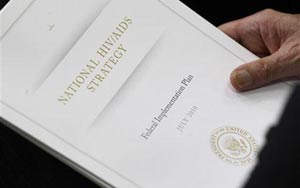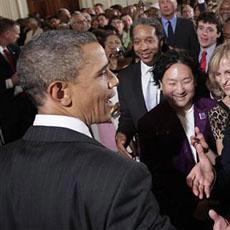|
 A copy of the National HIV/AIDS Strategy. The plan calls for cutting infections in the United States by 25 percent in five years. |
Researchers, policy makers and activists are busy preparing for the International AIDS Conference. The next conference begins Sunday in Vienna, Austria.
On Tuesday, the Obama administration announced its National HIV/AIDS Strategy. The plan aims to reduce new HIV infections by 25 percent within five years. It also aims to make sure infected patients get treatment more quickly.
HIV is the virus that causes AIDS. The government says 65 percent of Americans who discover they are infected get treatment within three months. The new plan calls for increasing that to 85 percent.
|
 President Obama after speaking about the strategy at the White House. |
Over one million Americans are living with the virus, out of an estimated 33 million people worldwide.
Last week, government scientists in the United States announced the discovery of two antibodies that raise hopes for an AIDS vaccine. They say these antibodies can stop more than 90 percent of all known strains of HIV. Antibodies are proteins that the body makes to help protect itself against infection.
Researchers made the discovery at the National Institute of Allergy and Infectious Diseases. The director of its Vaccine Research Center, Gary Nabel, says each antibody blocks the virus from attaching to white blood cells.
GARY NABLE: "It reacts with that region, it inactivates the virus and the virus never has a chance to enter the cells that it would otherwise infect."
The antibodies were discovered in a man, known as Donor 45, whose body produced them naturally.
Patients with HIV must take medicine all their lives to prevent AIDS. Combinations of drugs are able to suppress the deadly virus in the body -- not a cure in the traditional sense, but the next best thing.
In another development, the United Nations reported Tuesday that the number of young people becoming infected with HIV in Africa is falling.
The UN AIDS agency gives credit to better use of preventive measures. It says young people in Africa are waiting longer to have sex. They are also having fewer sexual partners. And they are increasingly using condoms. As a result, the agency says HIV rates are falling in 16 of the 25 hardest-hit countries in Africa.
And that's the VOA Special English Health Report, written by Mario Ritter. I'm Steve Ember.
South Africa links HIV awareness campaign to World Cup
Small drug pouch may offer new tool to protect newborns from HIV
South Africa's huge HIV testing campaign
China ready to end HIV/AIDS entry ban
(來源:VOA 編輯:陳丹妮)
